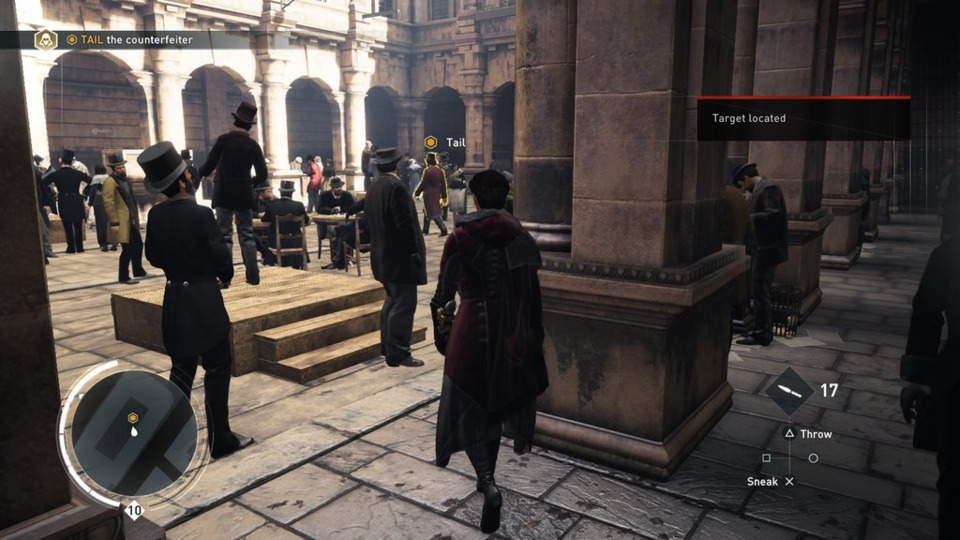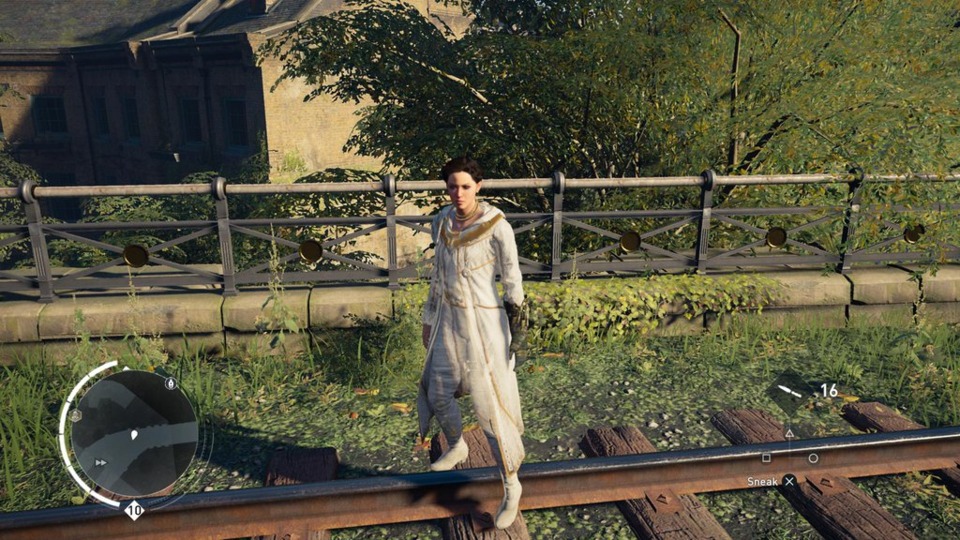The Completionist's Complaint
By Mento 20 Comments

I know how that title must sound: "Oh, Mento's going to spend another four thousand words excoriating Assassin's Creed Syndicate again." Well, yes and no. The title refers to both the airing of grievances but also to the pathological definition of the word "complaint". Like, say, the psychosexual dysfunction of the title character of Philip Roth's Portnoy's Complaint. I realize obsessively playing the same video game for over a hundred hours to get 100% completion is about as far away as you can get from having increasingly kinky sexual encounters with multiple partners, but there's almost assuredly a similar psychological compulsion behind both. Anyway, I'm not here to talk literature; what do I look like, a book reader? I have too many open-world side-missions left to complete to spend time on anything like that.
The Completionist's Complaint, at least as far as this particular article's purview goes, can also refer to a pathological condition that affects open-world games themselves as well, or at least their developers. Specifically, that the designers of open-world games create their worlds as a type of buffet: there's something for everyone, but it's not generally expected that one person will eat everything on offer. A game like Grand Theft Auto V will pack itself full of side-activities that emphasize the driving, the shooting or any other significant gameplay mode that's possible within the engine, to allow players who particularly like one or more of those modes to keep playing them, all the while earning rewards that benefit the main story progression. The player is free to pursue these optional objectives, but deep down I suspect that the developers give these side-missions less attention because of their entirely superfluous nature. As you continue to delve into side content, you'll see that there's less and less clever mission design and it all starts to feel like grinding and busywork. It's the very definition of video game bloat: these aspects are added because it's expected of the genre, though very few open-world game designers seem particularly enthused to expand upon these non-critical tasks and make them anything more than perfunctory repetition of extant story mission structures or assiduous scavenger hunts for arbitrarily scattered collectibles.

There are exceptions, of course. Incidental side quests that involve smaller stories unrelated to the main plot can often prove to be more entertaining and better-written than the core plotline itself. That's a frequent instance in Bethesda open-world games in particular, made all the more prevalent recently with the lackluster story campaign of Fallout 4. The Witcher 3: Wild Hunt received accolades for its side-quest writing and quality, to the extent that most reviews and retrospectives actively encourage the player to wander off and explore the Northern Kingdoms for extracurricular activities. Some collectibles, also, might require a little puzzle to reach them; whether that's a literal puzzle in the case of Batman Arkham's Riddler trophies or in more abstract topographical terms, like figuring out how to reach an object suspended high in the air. Well-considered collectible puzzles can really boost a game's longevity and appeal, as was the case for the more recent Super Mario games and some similar modern platformers. For games where collectibles are more of an afterthought, scattered around a world that didn't have to change to accommodate them in any meaningful way, it's simply a means to artificially boost a game's length.
Naturally, the question that arises from all this is "Why bother?". Why bother going to all this trouble with the finite time we have if the non-crucial progression is so tiresome and insignificant? That's where the Completionist's Complaint comes back into focus: certain video game players, and I include myself in their number, are almost psychologically compelled to chase 100% completion. Whether that comes down to an obsessive personality disorder, or a sense that a game isn't truly "complete" until 100%, or you haven't had your fill until you've seen literally (at least, according to the in-game progression criterion) seen everything the game has to offer, or one of possibly infinite other reasons why going "full Vinny" defines someone's preferred play style. This segment of the audience isn't negligible; the advent of achievements and trophies proved that there were a lot of gamers who wouldn't be satisified with anything less than total domination of a game, and to this day sites that measure a game's length - in particular "How Long to Beat?", a valuable resource for those with less and less free time for games as they grow older - have a separate category on every game's page for how long it might feasibly take a completionist type to beat it fully. We exist, in distressingly large numbers even, and so it does an open-world game zero good to not consider that audience segment when they decide to artifically pad out a game for the sake of some "it will take a hundred hours to explore everything!" bulletpoint for their promotional push.
Which brings us back around, inevitably, to Assassin's Creed Syndicate: one of the worst recent cases of open-world completionist bloat I've witnessed in recent years.
When registering and considering my dissatisfaction with AC: Syndicate the last two times I've written about the game, and how those opinions run very contrary to the many accolades the game has received from the gaming press, an epiphany came to me: it's because I'm playing this game as a completionist, rather than someone who rushes through the story missions and dips their toe into the side material as briefly as would be considered necessary for a comprehensive review of the game's content, because there might be deadlines looming, the commercial release is but mere days away and/or there are more games to write about that week. If you were to take Assassin's Creed Syndicate for just its story missions, and perhaps those side-missions involving the various famous historical figures you meet during the story - Charles Dickens, Charles Darwin and Karl Marx, to name but three - the game is a lot more palatable. The characters are well-written, the central sibling relationship between the analytical Evie and the impulsive Jacob is fantastic, both the London-centric and present-day stories go some places (even if the latter feels mostly like wheel-spinning, as the malevolent precursor and present ghost-in-the-shell Juno can only threaten to re-emerge and destroy the world for yet another game - a plot that hasn't gone anywhere since Desmond's fateful encounter with Juno at the end of Assassin's Creed III) and, restrictive bonus conditions aside, the mission design is varied and its core Templar assassination missions actually respect the idea that the player may want to consider multiple different routes to their target.

Yet if you were going into AC: Syndicate with the lofty intent of nothing short of 100% Synchronization, the game's not only a frustrating bore but also an occasionally broken one. It's telling how quickly the rest of the game was made after the more important parts - the central story, the faithful recreation of 19th century London, the introduction of new mechanics and features - had already been completed, in order to make Ubisoft's mandated annual release schedule (until this year) for the Assassin's Creed franchise. Perhaps this is my cynicism talking, but it seems clear to me that the developers were hoping that the people who review games that matter - that is, those working for major publications and sites who receive review copies and bash through them quickly for the sake of their expectant audience - would review the game positively based on those core elements and would never discover just how poorly conceived the game becomes for those chasing that elusive 100%.
It's not enough to talk about how the game has four territory takeover side-mission types that you repeat endlessly in order to conquer the whole of London. We're talking 15+ of each instance, each about fifteen to twenty minutes long, with zero variation except that the higher level areas have more goons to elude or strike down which really does nothing but stretch out the time it takes to complete them. Nor how the game's many carriage races gradually increase their difficulty in the worst ways racing games have always done: by rubberbanding AIs when they're behind and giving them unfair advantages, like being faster on straights. Nor even how every beer collectible is found in an identical corner pub, how every illustration collectible is found on an identical pedestrian tunnel wall, how (almost) every pressed flower collectible is found on an identical park bench and how every other collectible type either has no maps at all, or ones you have to pay for with the game's microtransaction currency, psychologically preying on those hunting for 100% on their playthroughs for more money. I don't even want to go into the horribly restrictive and frustrating full synchronization bonuses and how they've actively made an Assassin's Creed game worse with their inclusion for the sixth or seventh game running. No, the most telling and damning issue when approaching the game's 100% completion point is related to how every side-activity is attached to a specific ally character in the game: the fellow assassin Henry Green; the American organized crime representative (and transsexual - the second trans character I've seen in a video game in as many months, so that's a good sign) Ned Wynaut; or the gregarious bookie Robert Topping, as a handful of examples. When you max your loyalty to them, you receive one of the game's best items of equipment, yet this item is given to you the moment you complete the mission that tops out their loyalty gauge. Each of them has a subsequent little non-mission cutscene that appears somewhere on the map in which they basically thank you for your help and wish to give you a gift for your troubles; the implication is that the gift is the high-level item you've already received, making these cutscenes entirely superfluous. It's clear that at some point the game was modified to dole out rewards the moment the loyalty bar hits a new target rather than during these cutscenes, but they didn't go back to fix the problem - like, say, having the cutscenes play directly after the mission that maxed them out, or removing the now redundant scenes completely. It wasn't a priority to fix this problem, because they presumed only a fraction of gamers would ever get that far.

It's fair to say that, for a completionist, Assassin's Creed Syndicate feels as rushed and as disappointingly broken as all the previous Assassin's Creed games, made all the more irritating by the fact that so little effort goes into ameliorating these franchise-long problems with each new iteration. It is at this point that I invoke the game's perks system. Earning the game's many perks is only for the truest of the hardcore, as they require an unconscionable amount of grinding for some minor permanent buffs; tasks like defeating four or enemies in one encounter without getting hit on at least fifty separate occasions, or killing someone from cover with a knife - not just regular knife kills, but from behind cover - seventy-five times. But in creating a system like this for the particularly determined to pursue, it shines a spotlight on a lot of problems the AC games have been struggling with for multiple iterations: if you want the perk earned from defeating four enemies with the same animation, which requires dropping all four to near death state first, you'll have to contend with how frequently the game simply doesn't register that another near-death enemy is nearby and only performs the three- two- or just one-person kill animation. If you're going for cover kills, you'll have to contend with how poorly the game conveys what consitutes as cover and how unreliable it can be for protagonists to "stick" to cover when the player is pressed for time. You want the perk acquired by performing fifty "multi-counter finishers"? You'll have to damn well pray that two enemies attack you at once, because such an instance is entirely based on luck and so rarely ever seems to happen, and then repeat it forty-nine more times.
This, plus bizarre achievements (another trigger of the Completionist's Complaint) like destroying 5000 roadside objects while driving a carriage when most players are unlikely to hit 1% of that number naturally just demonstrate the game's complete lack of accord to those of a more obsessive bent. Open-world games should not be designed this way. Either cut out the bloat and let those players hit 100% without too much more effort than it would take to complete the game normally or put as much care into these side-activities as you would into every other aspect of the game, because even if the professionals won't ever touch upon the pacing and structural problems that are only likely to vex the completionist set, us weirdos will have a few words to say.
Just, you know, eventually. We might need a few weeks.
